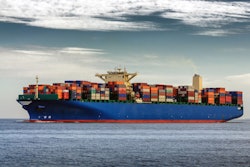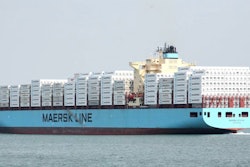Joint offering combines wireless devices, integrated network to provide container tracking, increased security
Armonk, NY — September 22, 2005 — IBM and Maersk Logistics, of the A.P. Moller-Maersk Group, are collaborating on a new initiative to bring better real-time visibility to global supply chain operations by improving the quality of container tracking and enabling increased security of transported goods.
The joint solution includes intelligent wireless tracking devices and a technology network for use by manufacturers, retailers, logistics providers, carriers and governments to share real-time cargo information.
The two companies said that during joint development IBM and Maersk Logistics brought together research, business consulting and engineering teams, along with technology experts and internal specialists in the field of customs, ports and border management, supply chain management and transportation.
The solution incorporates IBM's hardware and software technologies alongside Maersk Logistics' global supply chain expertise. The organizations said they have integrated two key emerging technologies for the first time:
"IBM's objective is to enable globally integrated business by capitalizing on the information generated during the tracking process and, at the same time, improve the security of cargo," said Mogens Roedbro, partner and vice president with IBM Business Consulting Services. "This initiative, which IBM refers to as Intelligent Trade Lane, is part of our broader Global Movement Management effort designed to address the critical business functions involved in efficiently and securely moving people, goods and conveyances within and between countries."
"Security and supply chain optimization are key focus areas for our clients today," said Henrik Ramskov, managing director at Maersk Logistics. "The capabilities of the TREC device and network eliminate the time lag of the physical container status to provide real-time visibility. This provides new opportunities for truly adaptive planning while also maintaining data quality. This enables effective decision-making, supporting supply chain agility. Combined with Spective, our business intelligence solution, we will further enhance our clients' customer service levels while reducing the costs of achieving these."
James Rice, director of the Integrated Supply Chain Management Program at Massachusetts Institute of Technology, noted that some of today's shipping logistics involves enormous levels of complexity, dated processes including lengthy paper trails and limited levels of security. "The ability to create an environment where all supply chain participants have real-time visibility while also leveraging industry standards will eliminate some of this complexity," Rice said. "The IBM and Maersk initiative offers a promising approach for a more truly resilient and secure trans-border supply chain."
While the solution is slated to be ready for commercial application next year, IBM and Maersk Logistics currently are involving various supply chain stakeholders in a formal pilot. Phase one field testing is scheduled to begin in early November 2005, followed by a large commercial pilot in March 2006.
Additional Articles of Interest
— For an in-depth look IBM's supply chain transformation initiative, read the interview with Linda Cantwell, IBM vice president for business growth initiatives, in the article "Breaking the Silo Mentality" in the April/May 2004 issue of Supply & Demand Chain Executive.
— Looking for the best carriers for your organization? Here are seven tips to help you on your way. Read the SDCExec.com exclusive, "Need Capacity? Get Flexible."
— Eugene McCabe, architect of Sun Microsystems' Customer Fulfillment in Transit process, discusses the challenges and rewards of taking links out of the company's supply chain in "Anatomy of the 'Zero Touch' Supply Chain," in the August/September 2005 issue of Supply & Demand Chain Executive.
Armonk, NY — September 22, 2005 — IBM and Maersk Logistics, of the A.P. Moller-Maersk Group, are collaborating on a new initiative to bring better real-time visibility to global supply chain operations by improving the quality of container tracking and enabling increased security of transported goods.
The joint solution includes intelligent wireless tracking devices and a technology network for use by manufacturers, retailers, logistics providers, carriers and governments to share real-time cargo information.
The two companies said that during joint development IBM and Maersk Logistics brought together research, business consulting and engineering teams, along with technology experts and internal specialists in the field of customs, ports and border management, supply chain management and transportation.
The solution incorporates IBM's hardware and software technologies alongside Maersk Logistics' global supply chain expertise. The organizations said they have integrated two key emerging technologies for the first time:
- Intelligent real-time tracking devices, called Tamper-Resistant Embedded Controllers (TREC), which are fitted to cargo containers and designed to withstand the environment in which they operate. Unlike typical passive tags that collect data only, the wireless TREC devices incorporate significant processing power, enabling them to instantly receive and send data. The devices automatically collect information on each container, including physical location, based on GPS, parameters such as temperature and humidity and sensory readings to detect intrusion.
- An integrated network that combines data from the TREC devices with a non-proprietary sensor network and business integration system. According to the two companies, this network eliminates manual processes and enables accredited supply chain participants access to relevant data. The information gathered can be connected to decentralized databases where each participant owns its own content and a service oriented infrastructure that allows users to instantly share information.
"IBM's objective is to enable globally integrated business by capitalizing on the information generated during the tracking process and, at the same time, improve the security of cargo," said Mogens Roedbro, partner and vice president with IBM Business Consulting Services. "This initiative, which IBM refers to as Intelligent Trade Lane, is part of our broader Global Movement Management effort designed to address the critical business functions involved in efficiently and securely moving people, goods and conveyances within and between countries."
"Security and supply chain optimization are key focus areas for our clients today," said Henrik Ramskov, managing director at Maersk Logistics. "The capabilities of the TREC device and network eliminate the time lag of the physical container status to provide real-time visibility. This provides new opportunities for truly adaptive planning while also maintaining data quality. This enables effective decision-making, supporting supply chain agility. Combined with Spective, our business intelligence solution, we will further enhance our clients' customer service levels while reducing the costs of achieving these."
James Rice, director of the Integrated Supply Chain Management Program at Massachusetts Institute of Technology, noted that some of today's shipping logistics involves enormous levels of complexity, dated processes including lengthy paper trails and limited levels of security. "The ability to create an environment where all supply chain participants have real-time visibility while also leveraging industry standards will eliminate some of this complexity," Rice said. "The IBM and Maersk initiative offers a promising approach for a more truly resilient and secure trans-border supply chain."
While the solution is slated to be ready for commercial application next year, IBM and Maersk Logistics currently are involving various supply chain stakeholders in a formal pilot. Phase one field testing is scheduled to begin in early November 2005, followed by a large commercial pilot in March 2006.
Additional Articles of Interest
— For an in-depth look IBM's supply chain transformation initiative, read the interview with Linda Cantwell, IBM vice president for business growth initiatives, in the article "Breaking the Silo Mentality" in the April/May 2004 issue of Supply & Demand Chain Executive.
— Looking for the best carriers for your organization? Here are seven tips to help you on your way. Read the SDCExec.com exclusive, "Need Capacity? Get Flexible."
— Eugene McCabe, architect of Sun Microsystems' Customer Fulfillment in Transit process, discusses the challenges and rewards of taking links out of the company's supply chain in "Anatomy of the 'Zero Touch' Supply Chain," in the August/September 2005 issue of Supply & Demand Chain Executive.
- More articles about IBM.
- More articles about Maersk Logistics.


















